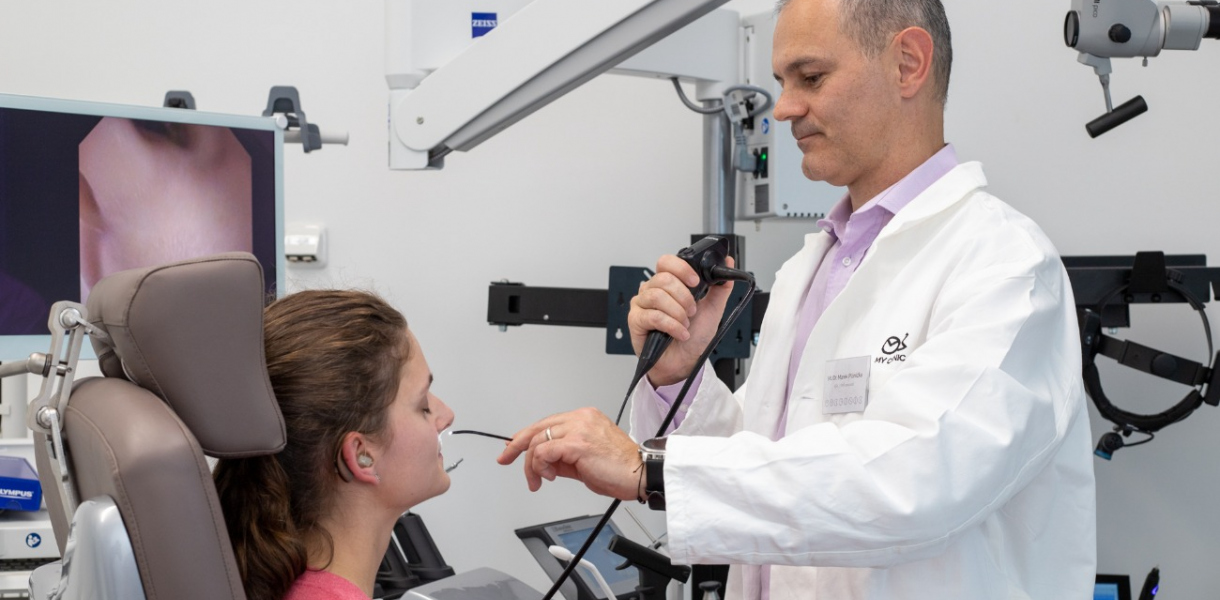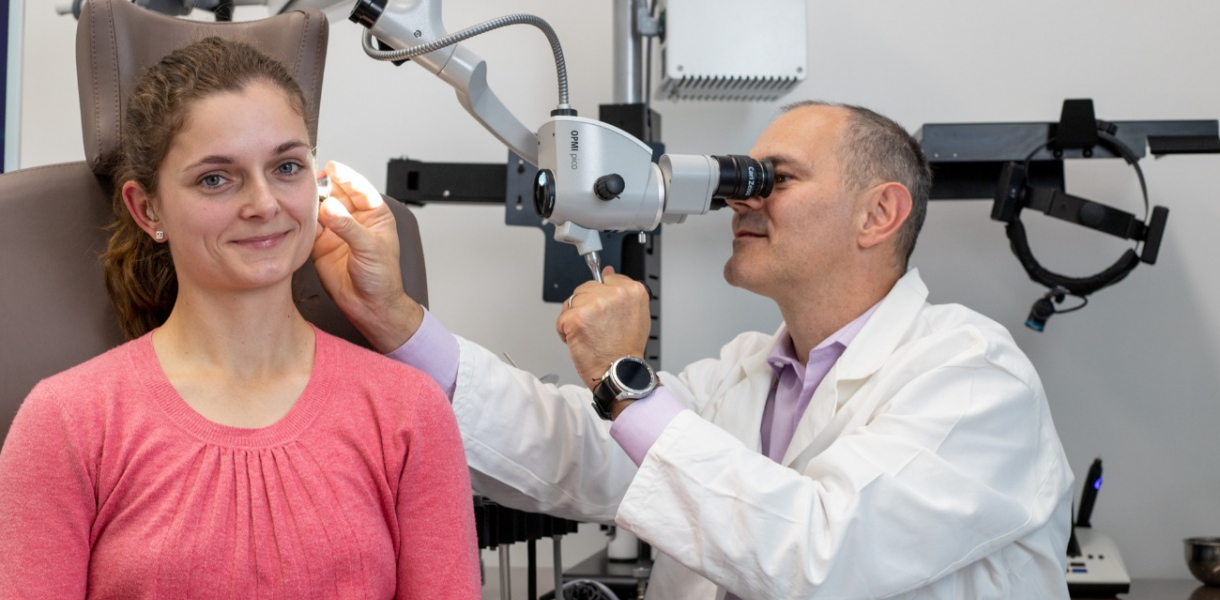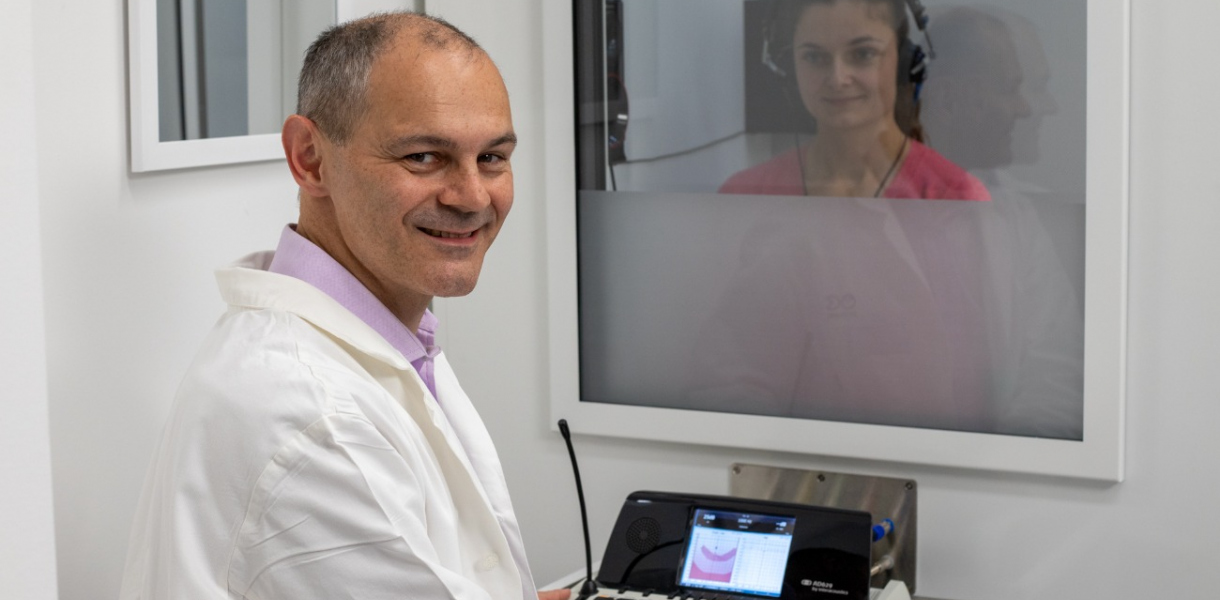What are the most typical complaints which send patients to your doorstep during the winter season?
From fall to the beginning of spring, respiratory illnesses are common; patients see us with sinusitis. Some readers may be surprised to hear that the telltale symptom of this disease, aside from a clogged or running nose (which often need not be all that prominent), is actually the dry cough I mentioned earlier. A long-term sinusitis (which may become latent) certainly requires the care of an ORL specialist. In children, the head cold is often associated with middle ear infections. In recent times, patients often come to see us because they suffer from states of vertigo (dizziness).
What other complaints are you able to help alleviate at an ORL outpatient facility?
The range is very broad indeed. Aside from the ones I already mentioned – sinusitis, middle ear infections, vertigo – we e.g. treat patients who have troubles with their salivary glands; rather surprisingly, we also fairly frequently see patients with a thyroid disease. We help patients who suffer from nosebleeds – that’s one of the issues which we are often able to resolve on the spot as long as the character of the complaint allows for outpatient treatment. We strive to accommodate our patients’ needs and to help them on the spot, if at all possible, with all kinds of complaints that reduce their quality of life. In the future, we want to further expand the services of our ORL outpatient practice to offer e.g. sleep medicine, for which demand is growing fast. Sleep disorders are common and again may have a number of causes. We also plan to devote some of our capacity to helping patients retain their voice and their hearing, and procuring hearing aids for those whose hearing has deteriorated. And that’s only the beginning!
Would you recommend regular preventative ORL screenings? Who may benefit from them, and in what ways?
Preventative care for one’s own health ought to be a fundamental part of any active person’s approach to life, and I cannot recommend it enough. Of course, oncological prevention is particularly important – especially if the patient comes from a family with a history of cancer. Also, if their voice has been hoarse or inferior for some time, if they have difficulty swallowing, feel pressure in their throat, or notice any hardening in the neck area. Prevention also means caring for a proper balance between mental and physical exertion, which greatly influences the digestive system and thus also the condition of mucous membranes in the throat and nose. A preventative examination also provides the ideal opportunity to perform minor interventions such as removing earwax plugs. They quite commonly build up in a lot of people; patients may then be hard of hearing, or experience other issues such as a ring or buzz in the ears, a sensation of pressure or even pain. At the same time, the issue is easily resolved, and if the patient sees us early – e.g. because of their biannual preventative exams – it will take only a few minutes to clear their ear canals. I ought to mention at this point that ORL prevention is part of the My Clinic Plus healthcare program available to our patients.
What does a typical ORL examination look like?
We set aside enough time for each patient, which is a huge advantage. Taking down a comprehensive anamnesis the proper way is of absolutely fundamental importance for all further diagnostic and therapeutic approach. During the examination, we touch some exceedingly sensitive parts of the human body, which is why we are extremely careful – patients definitely have nothing to worry about. If need be, we’ll use a topical desensitizing spray. Now, ultrasound screenings, for instance, which are an integral part of our examinations, are completely painless, and so are a number of diagnostic approaches. In these, we draw upon the support of state-of-the-art devices. Our examination is comprehensive. We are used to working with very sensitive patients, adults and children alike.
What other aspects sets the client care at My Clinic apart from other healthcare facilities and doctor’s offices?
Each and every patient is given ample attention; we take note of patients’ specific needs and how they feel during examination and treatment. The medical staff at My Clinic sets great store in an approach which is at once professional and humane. I already mentioned that we offer clients close interdisciplinary cooperation. Compared to other outpatient facilities, this comprehensiveness is one of our biggest upsides. We share information and are able to instantly consult other experts on the problems of patients; when acute treatment becomes necessary, the patient isn’t wasting valuable time on finding a suitable physician or waiting for a free timeslot in busy appointment schedules. The entire treatment process is thus sped up, which of course may be of decisive importance – above all in more serious diseases, but also in the case of standard complaints which nonetheless make the patient’s life unpleasant.
Do you have any helpful tips on how to better care for our own health right now?
You want to look after the mucous membranes of your nose, throat, and mouth. They’re best kept moist, especially if you operate in a dry environment – use saline solutions in a sprayable form, or oil-based nasal drops. I can also recommend the preventative use of olive oil. A teaspoon a day is enough to create a protective film across the mucous membrane (and you can increase the dose to up to a tablespoon, if need be). I try to explain to patients that, as always, keeping things balanced and in reasonable moderation is important. One common problem we often encounter in our practice, for instance, is the excessive use of nose drops. In the overwhelming majority of cases, the recommended use of nose drops is for no more than one week. This doesn’t mean that patients can safely apply them if they do so only once a day, or once in a while. The nasal mucosa becomes dependent on those nasal drops fairly quickly, and then loses its natural protective capabilities. Very frequent gargling is likewise problematic: it, too, disturbs the delicate balance of the mucous membranes. In this way, we are unnecessarily asking for potential trouble. It’s important to look well after one’s paranasal sinuses, know how to properly clean one’s airways. Breathing through the nose warms up and moisturizes the air, protects the upper airways, and has a positive impact on body and mind.
What is your opinion on wearing face masks and respirators?
They provide solid protection of our airways and mucous membranes, not only against viruses. Right now, during winter, face masks and respirators cushion the blow of abrupt temperature changes as we breathe through them, which means the mucous membranes are less irritated. Even so, there are pros and cons. Of course, one should regularly replace one’s respirator, follow certain rules; if done properly, I’m all for it.
What was it that drew you to otorhinolaryngology, and what's your subspeciality within the field?
The field as such is endlessly fascinating. It understands humans in their complexity and brings together a variety of approaches, touching upon endocrinology, neurology, to some part also rehabilitation, physical therapy, and a number of others. It is this complexity that I enjoy a lot. My focus is on soft tissue surgery, thyroid surgery, and surgery of the salivary glands. I was the first surgeon in the Czech Republic to venture into noninvasive endoscopy of the salivary glands, and I’d love to return to this specialization at some point and further develop my skill base. From a medical point of view, vertigo attacks are another interesting problem. The dizziness comes from a poorly coordinated sense of balance, originating sometimes from a straightforward cause such as sinusitis though there may be more behind it, such as neurological or cardiological issues. Finding out the true culprit sometimes almost amounts to detective work.
At My Clinic, you often work with clients from abroad. You speak English, German, French and Italian. Have you noticed any difference when it comes to the needs of foreign patients?
I’ve spent a fair number of years on foreign internships. I believe I’m quite capable of putting myself into the mindset of clients who are in a foreign country, who left their familiar environment, who are often exposed to enormous pressure. In terms of the quality of medical care, I see a lot of added value in the fact that we at My Clinic are used to working with these clients and that we have a lot of understanding for the kind of situations brought about by living in another country. Another obvious benefit for the client is our ability to converse with them in a language they understand – and this is true regardless of the patient is a child or an adult: they trust me to properly understand their complaints and needs. And that helps a lot.










